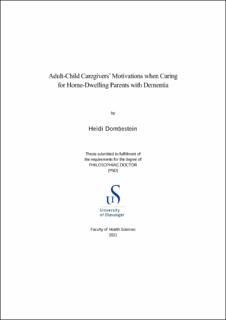| dc.contributor.advisor | Aase, Karina | |
| dc.contributor.advisor | Norheim, Anne | |
| dc.contributor.author | Dombestein, Heidi | |
| dc.date.accessioned | 2021-06-25T09:35:45Z | |
| dc.date.available | 2021-06-25T09:35:45Z | |
| dc.date.issued | 2021-06 | |
| dc.identifier.citation | Adult-Child Caregivers’ Motivations when Caring for Home-Dwelling Parents with Dementia by Heidi Dombestein, Stavanger : University of Stavanger, 2021 (PhD thesis UiS, no. 590) | en_US |
| dc.identifier.isbn | 978-82-8439-008-6 | |
| dc.identifier.issn | 1890-1387 | |
| dc.identifier.uri | https://hdl.handle.net/11250/2761324 | |
| dc.description.abstract | Background
It is often seen as demanding to be an informal caregiver of a home-dwelling relative or friend with a long-term illness. Adult-child caregivers are important resources for both their ill parents and their community healthcare services. Dementia is one of the most severe chronic long-term illnesses and represents comprehensive challenges for public health in Norway as in the rest of the world. Research within the caregiver field has generally focused on primary caregivers, the burden of taking on the caregiver role, and interventions to improve health outcomes. Less research has been devoted to understanding how secondary caregivers, such as adult children, remain motivated and how they experience community healthcare services, applying recent theoretical approaches such as self-determination theory and relationship-centred care. Therefore, the overall aim of this thesis was to gain a deeper understanding of adult children’s motivations to remain in the caregiver role when parents with dementia live at home.
Methodology
The current PhD project applies a qualitative multi-method design including the following three methods: 1) an integrative literature review of the previous research literature concerning the motivation of caregivers of persons with long-term illnesses, 2) individual face-to-face semi-structured interviews with 21 adult-child caregivers who had home-dwelling parents with dementia, and 3) focus group interviews with 15 of the adult-child caregivers who had been individually interviewed. Analyses were conducted using narrative analysis and systematic text condensation.
Findings
There is consistency between caregivers of persons with long-term illnesses and persons with dementia, describing their quality of motivations and how they experienced being caregivers. High-quality motivation depends on the satisfaction of the caregivers’ three basic psychological needs for competence (understanding of diagnosis, management of symptoms, problem solving, communication skills, knowledge of appropriate healthcare services), autonomy, (available options, planning, freedom of choice regarding tasks), and relatedness, (interacting with parent with dementia and others, being part of the care team, mutual respect, acknowledgement, dialogue, belonging, meaning something to others). Thwarting those psychological needs could lead to amotivation. The main issues thwarting caregivers’ motivations include parents being resistant or refusing to receive community healthcare services, challenges in getting access to timely healthcare services, and not being appropriately involved in their services. Still, caregivers of persons with dementia often prioritised their parents’ needs over their own. The literature review found the three needs of competence, autonomy, and relatedness to be equally important in predicting the quality of caregivers’ motivations and thereby their wellbeing, as according to the self-determination theory. From the perspective of adult-child caregivers, these basic needs were confirmed as motivational drivers when caring for a home-dwelling parent with dementia. Yet, they reported relatedness as their main motivational driver, including relations with their parents with dementia, with persons in their social network, and with their parents’ community healthcare services. Caregivers wanted to be acknowledged as competent partners in the care team who utilise significant efforts to improve the home-dwelling period for their parents. These findings imply that healthcare professionals should value the importance of relatedness when interacting with caregivers of persons with dementia.
Conclusion
By applying self-determination theory combined with a relationship-centred care approach, this thesis offers a deeper understanding of caregivers’ motivations in the long-term illness context and, in particular, in caring for persons with dementia. A caregiver’s motivation is described along a continuum representing different qualities of motivation. Addressing caregivers’ motivations is necessary, as the quality of their motivations for caregiving has consequences for their health and well-being. Caregivers’ motivations to remain in this type of role are closely related to satisfaction or thwarting of their basic needs for competence, autonomy, and relatedness. To remain motivated throughout a parent’s trajectory of dementia, support to fulfil the three needs is required. Dyadic improvement efforts addressing both caregivers’ and patients’ needs are recommended. | en_US |
| dc.language.iso | eng | en_US |
| dc.publisher | University of Stavanger, Norway | en_US |
| dc.relation.ispartofseries | PhD thesis UiS; | |
| dc.relation.ispartofseries | ;590 | |
| dc.relation.haspart | Paper 1: Dombestein, H., Norheim, A. & Lunde Husebø, A. M. (2019). Understanding informal caregivers’ motivation from the perspective of self-determination theory: An integrative review. Scandinavian Journal of Caring Sciences. 34(2), 267–279. doi: 10.1111/scs.12735 | en_US |
| dc.relation.haspart | Paper 2: Dombestein, H., Norheim, A. & Aase, K. (2020). Caring for home-dwelling parents with dementia: A qualitative study of adult-child caregivers’ motivation. Nursing Open. 7(6), 1954-1965. doi:10.1002/nop2.587 | en_US |
| dc.relation.haspart | Paper 3: Dombestein, H., Norheim, A. & Aase, K. (2021). How to stay motivated: A focus group study of Norwegian caregivers’ experiences with community healthcare services to their parents with dementia. Accepted for publication in Health and Social Care in the Community. | en_US |
| dc.rights | Copyright the author | |
| dc.rights | Navngivelse 4.0 Internasjonal | * |
| dc.rights.uri | http://creativecommons.org/licenses/by/4.0/deed.no | * |
| dc.subject | demens | en_US |
| dc.subject | omsorg | en_US |
| dc.subject | pårørende | en_US |
| dc.subject | eldreomsorg | en_US |
| dc.title | Adult-Child Caregivers’ Motivations when Caring for Home-Dwelling Parents with Dementia | en_US |
| dc.type | Doctoral thesis | en_US |
| dc.rights.holder | ©2021 Heidi Dombestein | en_US |
| dc.subject.nsi | VDP::Medisinske Fag: 700 | en_US |

